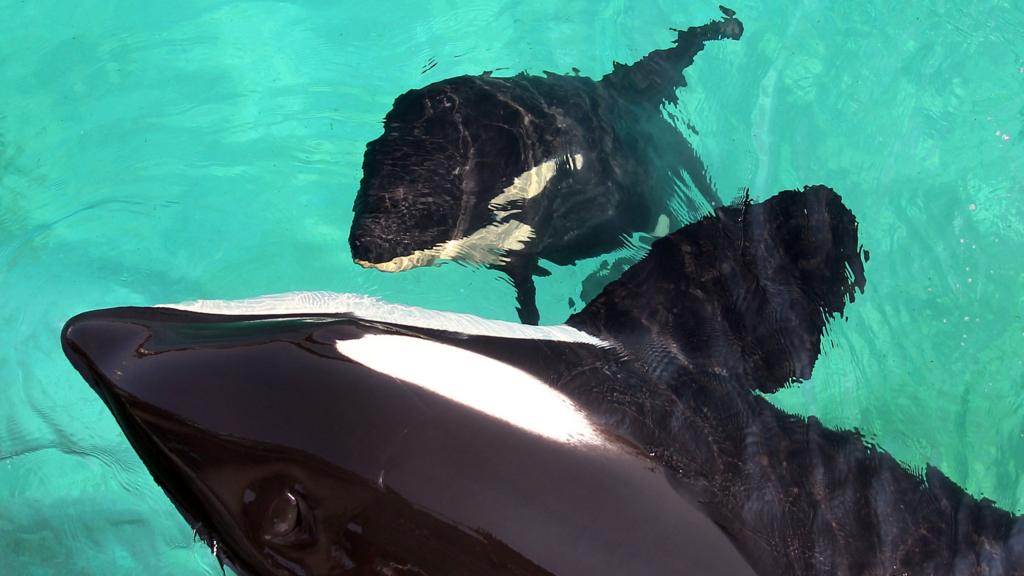A male orca residing at a shuttered marine park is reportedly undergoing sexual stimulation by trainers in an effort to prevent inbreeding with his mother.
Marineland Antibes ceased operations in January, yet an agreement has not been reached between park management, the French government, and animal rights organizations regarding the relocation of the orcas.
The closure precedes the enactment of a French law in December, which prohibits the use of cetaceans in marine park performances.
This stalemate leaves Wikie, 24, and her 11-year-old son, Keijo, remaining in their enclosures under the care of trainers at the southern France facility.
Last week, advocacy group TideBreakers released aerial footage depicting two trainers at the pool’s edge with Keijo, who is shown inverted in the water.
One trainer is seen holding a flipper while the other stimulates the orca, eliciting observable movement in the water.
Wikie is visible in a neighboring pool, facing her son’s location. Separating them permanently is considered detrimental to their well-being, given the social nature of orcas.
Captured on August 12, the footage prompted Marineland management to explain to BBC News that the intervention was deemed necessary due to Keijo’s escalating adolescent sexual urges.
“To prevent inbreeding with his mother, and to avert potential conflict and injury, Marineland opted for sexual stimulation to alleviate Keijo’s tensions.”
Management added, “Although visually striking, this procedure is natural and entirely painless for the animals.”
The French ecology ministry, responsible for approving the orcas’ relocation, confirmed being informed by Marineland that Keijo undergoes stimulation monthly, with veterinary consultation.
Valerie Greene, a TideBreakers member and former SeaWorld Orlando employee, characterized the sexual stimulation of Keijo as unconventional.
“During my tenure as an orca trainer, this behavior was exclusively associated with semen collection for artificial insemination purposes.”
Captive female orcas in marine parks are sometimes artificially inseminated to produce offspring, enhancing visitor appeal and performance capabilities.
This practice was relatively common until the last decade when legislative measures in countries such as France and the US restricted certain breeding practices.
However, Japan’s breeding regulations are less stringent, fueling speculation that Japanese marine park operators may seek orca semen following the death of their sole male orca, Earth, on August 3.
Marineland trainers were observed stimulating Keijo just over a week after this event.
Greene further noted, “Given Keijo’s inbred status, the prospect of his semen being used for captive orca breeding is even more alarming.” Keijo’s parents are maternal half-siblings.
Marineland management refutes this motivation, asserting that semen sales are prohibited and any export would require French government authorization.
The French ecology ministry has also stated that Marineland has denied any intention to collect and export orca semen for breeding.
“Regardless of the rationale, it is regrettable that this is prioritized over Keijo’s urgent need for rescue from an unsafe environment,” Greene stated.
“The concept of trainers providing sexual relief to an orca represents a new ethical low in the morally questionable practices of the captivity industry.”
Since then, there have been no significant developments regarding the pair’s potential relocation, and a European sanctuary site has not been established.
Concerns are also mounting regarding the conditions at Marineland and the safety of Wikie and Keijo remaining there.
Two weeks ago, Pannier-Runacher released another Instagram video in which she tried to allay fears about the orcas’ welfare and said regular inspections of the pools were taking place.
Katheryn Wise, wildlife campaign manager at the charity World Animal Protection, who has been monitoring the situation, tells us: “It is fair to say that the passivity of the French government when it comes to enabling alternatives for these animals, and communicating with organisations involved in developing professional sanctuary alternatives, is insufficient and is leading to unnecessary delays [in rehoming them].”
Rehoming animals after the closure of a zoo is often difficult, particularly for larger animals which require bigger facilities and higher levels of care.
When Living Coasts, a marine zoo in Devon, announced its closure in 2020, managers warned they might have to euthanise animals for whom they could not find new homes. Eventually places were found for all of them.
After Orsa Predator Park in Sweden shut in 2022, some of their polar bears did not find new homes until the following year. Two of the bears were transported to Suffolk but one died shortly after arriving.
Following a request by a French court, an expert assessment is being carried out of Marineland’s facilities and whether the orcas, and a dozen dolphins also still housed there, should be moved.
The French ecology ministry told us: “A task force set up by the ministry is working, under the aegis of the environment ambassador Barbara Pompili, to define a coordinated strategy at the European level for the care of orcas and dolphins, particularly those at Marineland.”
For Marketa Schusterova, a videographer who co-founded TideBreakers, the situation for Wikie and Keijo is bleak.
She says: “We have been advocating for a temporary tank to be built and expedited until a sanctuary is ready, but we’re worried that we are past that point. Time is running out.”
Dartmoor Zoo has welcomed two ‘tiny’ meerkat pups to its Meerkat Manor.
In May, they were only the second and third Amur leopard cubs to be born in the world this year.
Lions, penguins and camels line up for the annual weigh-in at Whipsnade.
Max Evans-Browning from Pembrokeshire becomes the newest recruit at a popular zoo attraction.
Red pandas are endangered so these cubs are “crucial” to the species says head zookeeper.

